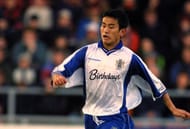To be a hero in a sport that doesn’t quite enjoy the same adulation and excitement could be hard at times - people don’t openly wax lyricals about your success and in a country that swears by cricket, chances are that interest in other games will be transient at best. And yet, for the first time in my life as a cricket fan, I am writing about a champion from another sport.
Exaggerated adjectives may not exhaust themselves while bestowing affluence on him but in the world of Indian football, Baichung Bhutia is every bit as accomplished a sportsperson as fellow countryman Sachin Tendulkar is at cricket. His exemplary contribution to Indian football has inspired a legion of youngsters to pursue their love for the game and has cemented his image as the poster boy of the sport in the country.
Known as the “Sikkimese Sniper” for his amazing shooting skills, Bhutia, in his illustrious 16-year long international career played for some of the best sides in the country along with stints with overseas clubs, including one in England. Needless to say then that he serves as a benchmark not just for Indian football, but for Asian football as well.
He first shot to prominence as a 16-year-old when he won the “Player of the Tournament” award playing for Sikkim in the Subroto Cup in Delhi. However, his career teed off after he joined East Bengal where he made giant strides on the field and emerged as the highest goal scorer (14 goals) in the Kolkata first division in 1994 winning the best player in the league award.
Maturing with each passing experience, he then moved to JCT in 1995 where he continued his great run, winning his first ever National Football League trophy. His exploits with the ball didn’t go unnoticed as he soon earned his first international cap in a match against Uzbekistan in the Nehru Gold Cup where he became the youngest Indian player to score a goal. Adding yet another feather to his cap, he won the “Indian Player of the Year” award in 1996.
The 1997-99 season saw the return of Baichung Bhutia to his first club East Bengal where he established himself as the undisputed star of Indian football. He went on to win the SAFF Cup with the National Team in 1997 and later, defended the title successfully in Goa in 1999. He was conferred the prestigious “Arjuna Award” by the Indian Government in 1998 for his incredible success in the game, the same year when he was given the captaincy of the East Bengal side.
Baichung was a sought-after talent and he became only the second Indian player after Mohammad Salim to play professionally (at that time) in Europe. Playing for Bury FC, he scored his first goal against Chesterfield in April 2000. Although he was largely only a squad member, he learnt a lot from his experiences with the English side that helped him better his own performances on his return to India.
After a short spell with Mohun Bagan which was marred by a spate of injuries, Baichung Bhutia returned to East Bengal where he again enjoyed great success. He played a key role in East Bengal’s historic ASEAN championship victory in 2003. Two years later, playing the last season of his third stint with East Bengal, he was named “Player of the National Football League” by the All India Football Federation.
After a successful season with East Bengal, he returned to Mohun Bagan for a second stint where he had decent success despite being mired in off-field controversies with his own club.
It was during this time that Baichung enjoyed unprecedented success on the National front as he led India to the AFC Challenge Cup triumph in 2008 and Nehru Cup again in 2009. He finally returned to East Bengal for one last stint but failed to leave an impression owing to a serious of unfortunate injuries.
Baichung also holds the distinction of being the only Indian footballer to have played more than 100 matches for his country, having donned the national jersey 107 times. And with the vast gamut of skills he possessed as a player, it is no surprise that he was once India’s highest goalscorer, with 42 international goals, till he was surpassed by Sunil Chhetri. He hung his boots on August 24, 2011, bringing down the curtains on a renowned career.
For an obvious lack of knowledge about the sport, I would refrain from commenting on his technical prowess and yet, from the very little that I know, speed and courage seemed to be his biggest assets as a player. He was extremely good at shooting with both feet and an expert header of the ball as well. That and a vast repertoire of other skills made him a force to reckon with on the football field.
However, Bhutia’s legacy should not be limited to just the playing field. In a nation obsessed with cricket, his towering achievements have inspired an enthusiast like me to go past just cricket and look at another sport as a medium of joy and pride.
As a kid, I was gripped by the bat and ball game. I still am, but my first tryst with Indian football was courtesy Baichung Bhutia - a name that’s now etched in echelons of footballing grandeur in bold alphabets. That to me is Baichung’s true legacy; the torchbearer of Indian football whose brilliance will be sustained in the memory long after so much else of this eccentric game is forgotten.

